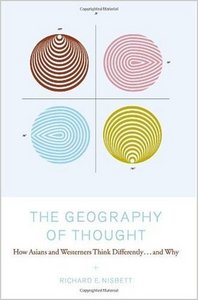The Geography of ThoughtHow Asians and Westerners Think Differently... and Why
|

|
 Diese Seite wurde seit 4 Jahren inhaltlich nicht mehr aktualisiert.
Unter Umständen ist sie nicht mehr aktuell.
Diese Seite wurde seit 4 Jahren inhaltlich nicht mehr aktualisiert.
Unter Umständen ist sie nicht mehr aktuell.
 Zusammenfassungen
Zusammenfassungen
 This book may mark the beginning of a new front in the science wars. Nisbett, an eminent psychologist and co-author of a seminal Psychological Review paper on how people talk about their decision making, reports on some of his latest work in cultural psychology. He contends that "[h]uman cognition is not everywhere the same"-that those brought up in Western and East Asian cultures think differently from one another in scientifically measurable ways. Such a contention pits his work squarely against evolutionary psychology (as articulated by Steven Pinker and others) and cognitive science, which assume all appreciable human characteristics are "hard wired." Initial chapters lay out the traditional differences between Aristotle and Confucius, and the social practices that produced (and have grown out of) these differing "homeostatic approaches" to the world: Westerners tend to inculcate individualism and choice (40 breakfast cereals at the supermarket), while East Asians are oriented toward group relations and obligations ("the tall poppy is cut down" remains a popular Chinese aphorism).
This book may mark the beginning of a new front in the science wars. Nisbett, an eminent psychologist and co-author of a seminal Psychological Review paper on how people talk about their decision making, reports on some of his latest work in cultural psychology. He contends that "[h]uman cognition is not everywhere the same"-that those brought up in Western and East Asian cultures think differently from one another in scientifically measurable ways. Such a contention pits his work squarely against evolutionary psychology (as articulated by Steven Pinker and others) and cognitive science, which assume all appreciable human characteristics are "hard wired." Initial chapters lay out the traditional differences between Aristotle and Confucius, and the social practices that produced (and have grown out of) these differing "homeostatic approaches" to the world: Westerners tend to inculcate individualism and choice (40 breakfast cereals at the supermarket), while East Asians are oriented toward group relations and obligations ("the tall poppy is cut down" remains a popular Chinese aphorism). Dieses Buch erwähnt ...
Dieses Buch erwähnt ...
 Zitationsgraph (Beta-Test mit vis.js)
Zitationsgraph (Beta-Test mit vis.js)
 1 Erwähnungen
1 Erwähnungen 
- Risiko - Wie man die richtigen Entscheidungen trifft (Gerd Gigerenzer) (2013)

 Volltext dieses Dokuments
Volltext dieses Dokuments
 Bibliographisches
Bibliographisches 
 Beat und dieses Buch
Beat und dieses Buch
Beat hat dieses Buch während seiner Zeit am Institut für Medien und Schule (IMS) ins Biblionetz aufgenommen. Beat besitzt kein physisches, aber ein digitales Exemplar. (das er aber aus Urheberrechtsgründen nicht einfach weitergeben darf). Aufgrund der wenigen Einträge im Biblionetz scheint er es nicht wirklich gelesen zu haben. Es gibt bisher auch nur wenige Objekte im Biblionetz, die dieses Werk zitieren.











 Evolution
Evolution , 1063 kByte)
, 1063 kByte) 



 Biblionetz-History
Biblionetz-History